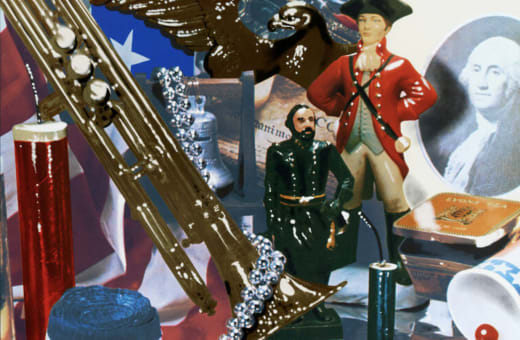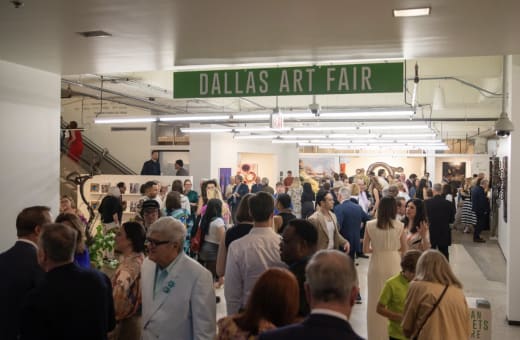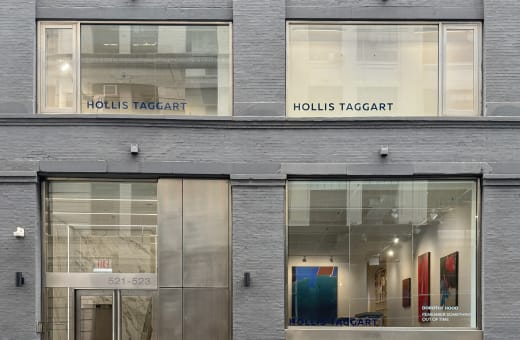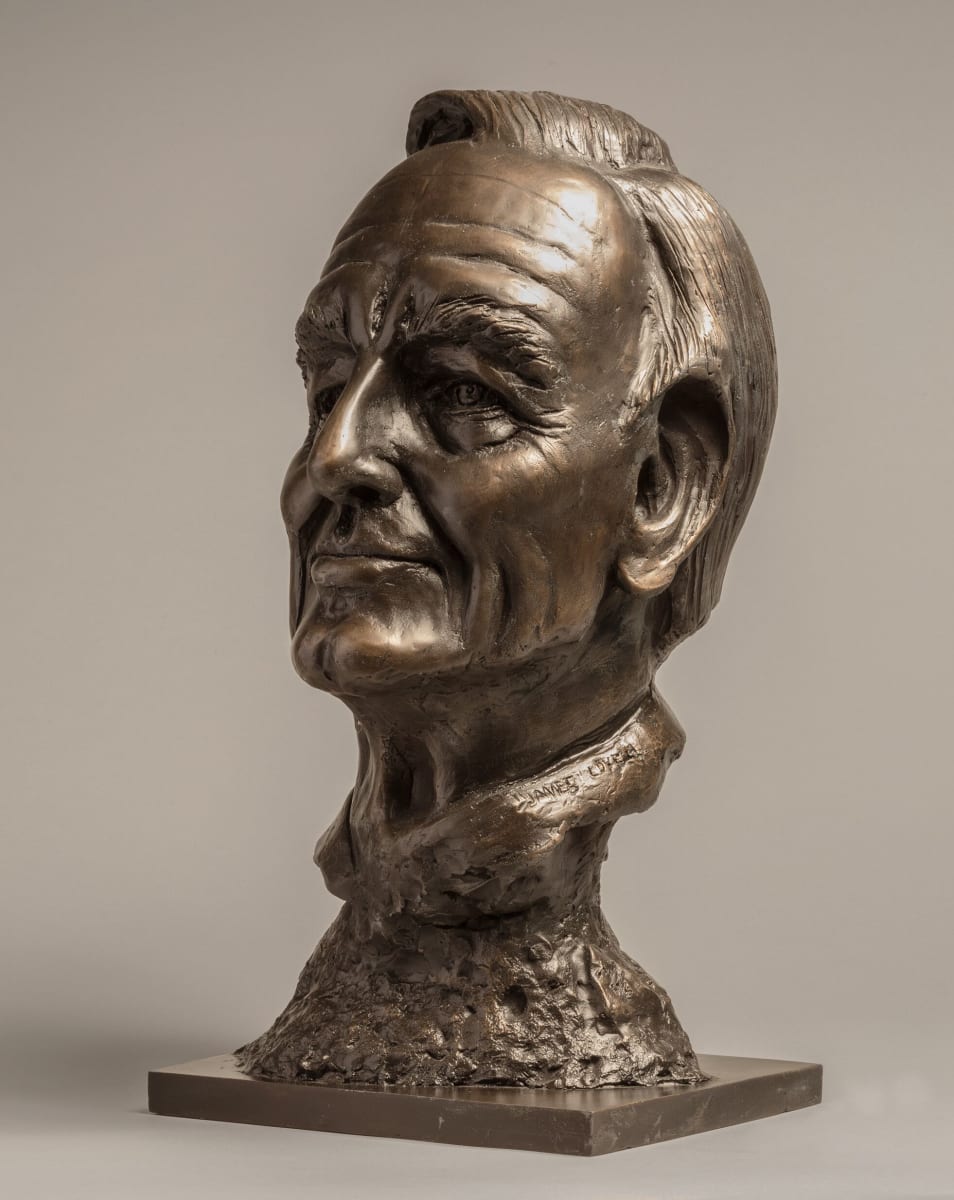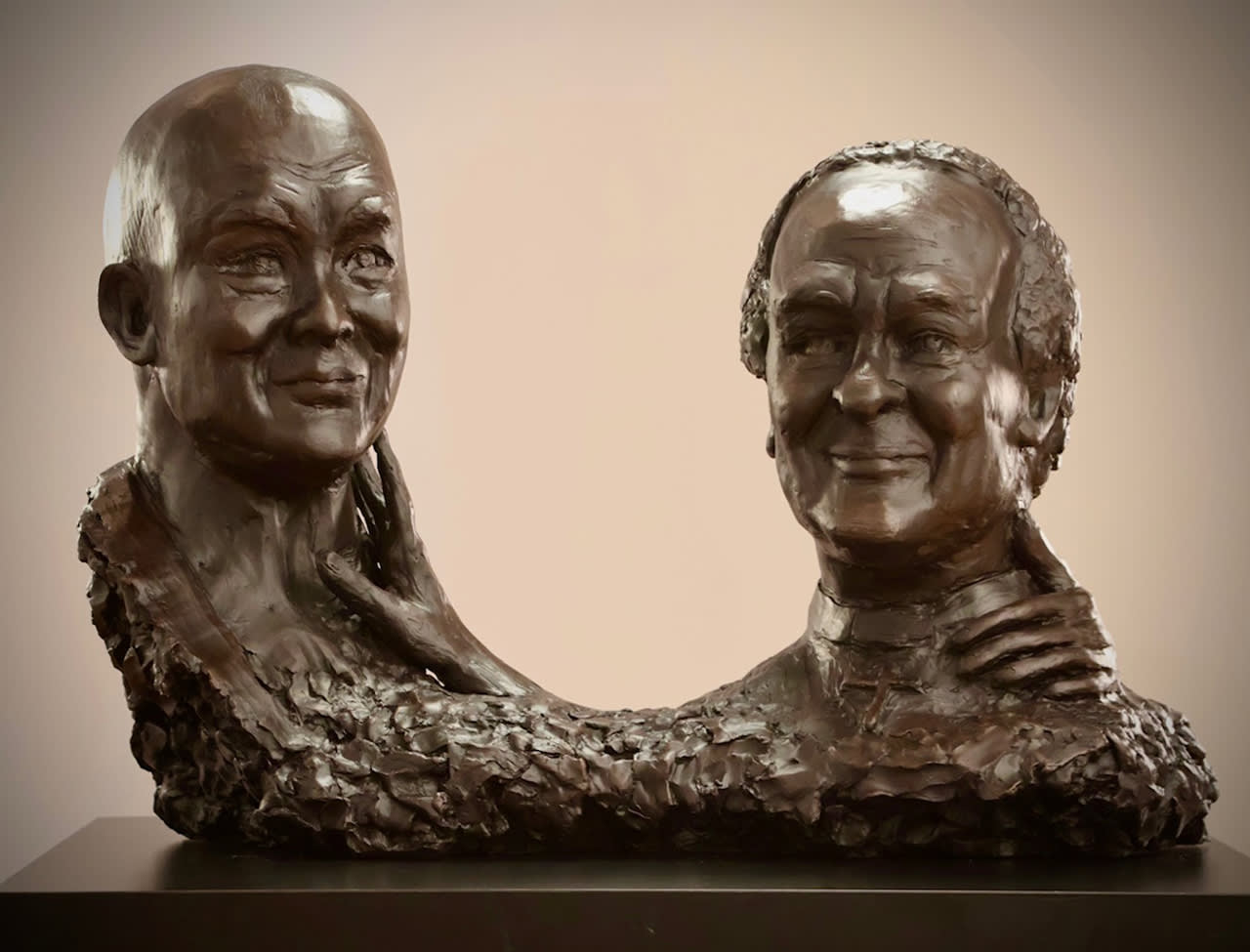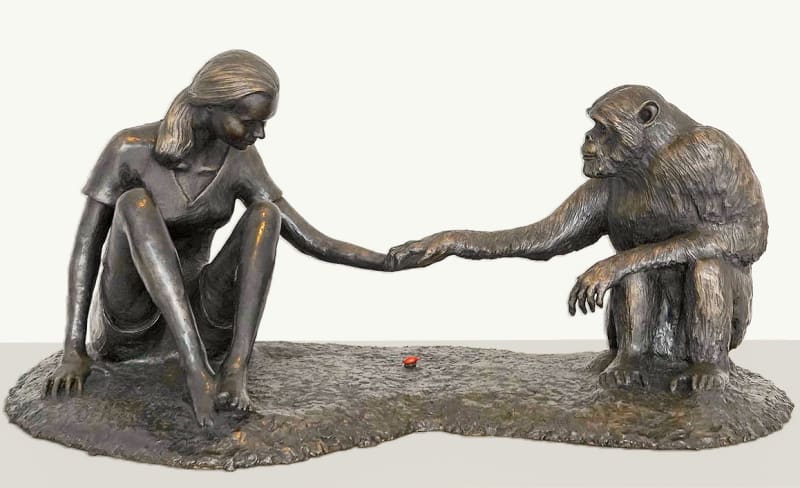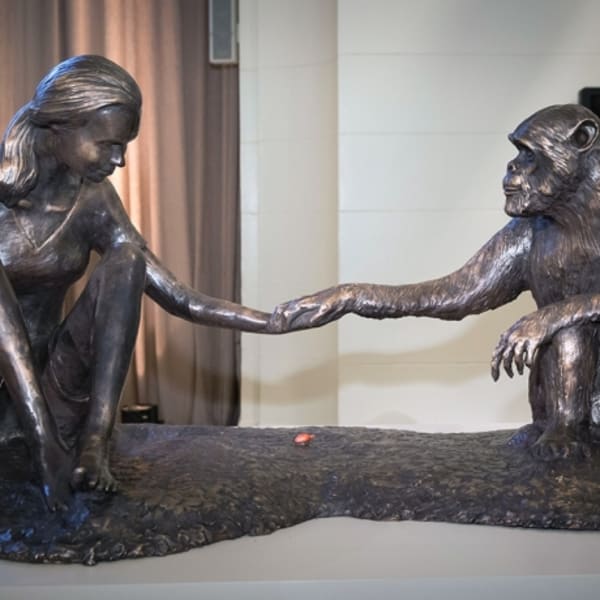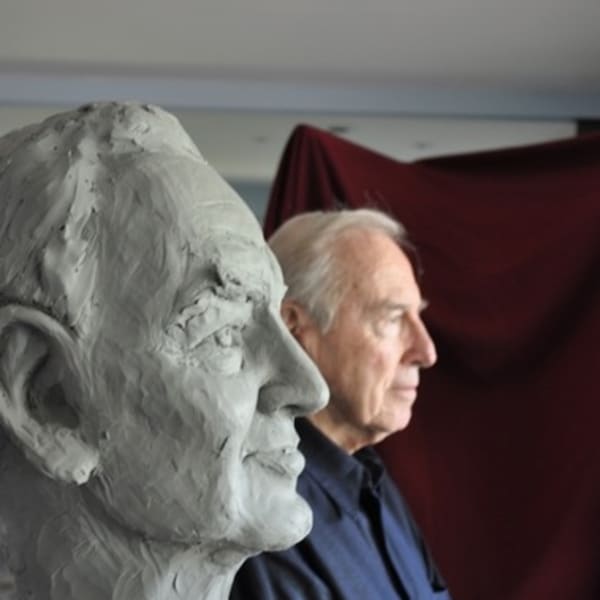
Friedman has a masterful ability to authentically reproduce the sitter’s physical form while simultaneously capturing the essence of a persona.
Ms. Friedman’s oeuvre of public and private installations includes her latest project, the lyrical narrative monument sculpture of primatologist Jane Goodall and the famous Gombe chimpanzee David Greybeard. In collaboration with and inscribed by Dr. Goodall, The Red Palm Nut is now on permanent display at the Field Museum of Chicago. Other commissioned works include the powerful rendering of Dr. Maya Angelou, sanctioned by The Caged Bird Foundation and her regal portrait sculpture of Abraham Lincoln for the Abraham Lincoln Presidential Museum and Library Foundation. Ms. Friedman
Ms. Friedman’s oeuvre of public and private installations includes her latest project, the lyrical narrative monument sculpture of primatologist Jane Goodall and the famous Gombe chimpanzee David Greybeard. In collaboration with and inscribed by Dr. Goodall, The Red Palm Nut is now on permanent display at the Field Museum of Chicago. Other commissioned works include the powerful rendering of Dr. Maya Angelou, sanctioned by The Caged Bird Foundation and her regal portrait sculpture of Abraham Lincoln for the Abraham Lincoln Presidential Museum and Library Foundation. Ms. Friedman was chosen by the Apollo 13 astronaut Captain James Lovell to sculpt his likeness. The striking sculpture, in collaboration with and inscribed by Captain Lovell, is permanently exhibited at his namesake hospital. United States Supreme Court Justice Sandra Day O’Connor, with sittings at the Supreme Court, Archbishop Desmond Tutu and former President of Poland and Solidarity leader Lech Walesa were the Lincoln Leadership Prize recipient commissioned portraits for the Abraham Lincoln Presidential Library Museum Foundation. Rosa Parks, Julius Rosenwald and Booker T. Washington have also been subjects of the artist’s impressive body of work.
Embracing the subtlety of expression in her art, Friedman has a masterful ability to authentically reproduce the sitter’s physical form while simultaneously capturing the essence of a persona. Influenced by the French Realist tradition, Friedman developed a solid foundation in two dimensional portraiture at the Art Students League and the National Academy of Design in New York City, independent study in Italy and France and L'Ecole Albert Defois in the Loire Valley, France. Self taught in sculpture she approaches clay with the confidence of history and the freedom of an autodidact. Intuitively delving directly into the medium, Friedman engages the subject to join her in a creative, collaborative experience. Her sensitive, nuanced renderings in clay are wondrous. Cast in bronze they are powerful timeless treasures; a tangible, tactile record of life.
'Friedman’s work illuminates the artist’s reverence for a nuanced and delicate, yet powerful, interpretation of her subject.' - Hollis Taggart Galleries Chicago. Alan Artner, Chicago Tribune art critic, states of her one woman retrospective at Hollis Taggart Galleries Chicago, ‘Friedman Show Evinces Portraiture Elegance..... [ Her paintings ] present the artist’s strong technique with admirable, even beguiling, clarity.'
Born in 1954 and raised in Chicago's Hyde Park neighborhood, Marla Friedman's first classical influence was the Museum of Science and Industry, living just across the street from the grand classicizing structure built as the Palace of Fine Arts for the 1893 World’s Columbian Exposition. As a professional painter in New York City she was drawn to another classical monument structure and maintained her painting studio in the historic
Carnegie Hall Studios; and was represented for her oil and pastel portraiture by the legendary Grand Central Gallery on West 57th Street. In painting she found her muse at Paris’ Musée d’Orsay. The official portrait of French president Jules Grévy, painted by Academician Léon Bonnat in 1880, completely transfixed her. It was the chance discovery of portrait sculptor Jo Davidson's autobiography, which showcased his expressive work in clay, that inspired Friedman to sculpt.
Viewing Friedman’s sensitive and insightful sculptures, it comes as quite a shock that she turned to the medium only recently. Building upon her accomplished career in portrait painting, Friedman tried her hand at sculpture for the first time in 2010. Bringing her skills in figurative painting and drawing into three dimension, the artist captures the likenesses of her subjects, but also conveys an intangible sense of inner spirit that is the product of careful observation and close research. The artist seeks a connection to her subjects that approaches the spiritual, in that she wishes to convey not merely their likeness, but a real sense of their personal presence. She describes this process as “listening,” in both an aural and a spiritual sense. Her sculptures develop out of an openness to the lived experience of the subject; they are formed from equal parts empathy and insight, resulting in compelling works that carry a weight beyond mere representation.
The artist revels in the opportunity to capture the spirit, the nuance and likeness of her subject. Beginning with her first sculpture, that of Apollo 13 astronaut Captain James Lovell, Friedman has had the pleasure of working with many superlative figures of recent history. Her collaborative portraits with Captain Lovell in both oil and bronze, installed at the United States Naval Academy Museum, the Abraham Lincoln Presidential Library and Museum, and the Captain James A. Lovell Federal Health Care Center, capture the space pioneer’s essential optimism and strong leadership. Likewise, her busts of Civil Rights activists Rosa Parks and Maya Angelou radiate a commanding sense of peace and inner strength. Each expresses their unique essence and is reflective of their individual contributions to the movement. Parks is depicted with eyes closed, as her "soul rested” upon making her momentous decision not to give up her seat on the bus. Dr. Angelou is rendered with hand outstretched, as if to usher her words as they rise into the world. Of her sculptural rendition of 'The First Lady of Civil Rights', Friedman explains, "I wanted to 'listen' and then impart in clay the resolute strength and spiritual quality of Rosa Parks and her brave pivotal moment in history ~ the tranquility of inner peace and her graceful, momentous life so well lived. In Rosa Parks' words, when she made the decision not to give up her seat her "Soul was Rested'." Dr. Jane Goodall and beloved chimpanzee David Greybeard, now immortalized at the moment of their soulful, historic connection. Across her oeuvre, Friedman celebrates the unique qualities of each individual. The exemplary accomplishments of her subjects in sculptures that are themselves unique and exemplary – deeply felt and masterfully accomplished.
The Oneness of Humanity, The Dalai Lama and Archbishop Desmond Tutu
Hollis Taggart is pleased to announce artist Marla Friedman’s sculptural exploration of The Oneness of Humanity, The Subtleties of Expression. Our human relatedness to one another and all sentient beings.
Two of the world’s most beloved spiritual leaders, the Dalai Lama and the late Desmond Tutu shared a remarkable friendship rooted in joy, respect, and a sense of higher purpose. Tutu fondly recounted the almost immediate kindred connection they shared: “He’s always teasing me... Maybe the first time [the Dalai Lama] was a little reserved, but by the second time [he] was taking my cap off my head. I don’t know that you wake up in the morning and say I’m going to become a friend to the Dalai Lama. It just happens.”
Despite inhabiting different faith traditions and backgrounds––Tutu was an Anglican priest dedicated to fighting against the apartheid in South Africa and the Dalai Lama is Tibet’s Buddhist spiritual leader who has been exiled for over fifty years––the two men found an unimpeachable bond in pouring out their lives in service of others. They considered themselves “mischievous brothers,” sharing a common love for the world and a deep-seated belief in the oneness of humanity. In her evocative sculpture of these two men, Marla Friedman has captured the essence of not just these two spiritual leaders, but also the essence of their friendship. In the sculpture, Tutu’s finger lightly grazes the Dalai Lama’s cheek in a symbolic reflection of the tenderness and profundity they shared. While the textured base gestures at the gravitas and enormous struggle of the lives and missions of these two men, the sculpture also hints at their sense of childlike joy and humor through their subtle facial expressions. While close together, they look outward in the same direction, instantiating their shared intention of carrying forth compassion and kindness for all beings.
This sculpture exemplifies Friedman’s masterful ability to capture not only the physical likenesses of her subjects, but also the intangible sense of their presence and inner spirit. Known for her sensitive rendering and careful process of observation and close research, Friedman describes her practice of sculpting figures as “listening,” in both an aural and spiritual sense. Beginning with a block of clay she allows the clay and “spirit” to lead her. Her works emerge out of an openness to the lived experience of the subject, resulting in a kind of felt ineffability that goes beyond factual representation.
Desmond Tutu and the Dalai Lama forged their lives out of the belief in the fundamental connectivity of humans, to which Friedman’s inspired sculpture gives form. At a public event before Tutu’s passing in 2021, the Dalai Lama poignantly turned to Tutu and remarked, “I think, at the time of my death, I will remember you.” Their cherished friendship, marked by equal measures of sanctity and laughter, was a celebration of life. In the face of brutality and exile, the two men have always sought out reconciliation and tirelessly searched for the ways in which we are, in the last analysis, all interlinked and related. “My humanity is bound up in yours,” Desmond Tutu reflected in 1999, “for we can only be human together.” Friedman’s nuanced sculpture suggests as much: the work of faith and art both speak to the same desire to give form to that which escapes language, namely, our fundamental commonness and interwoven fates.
